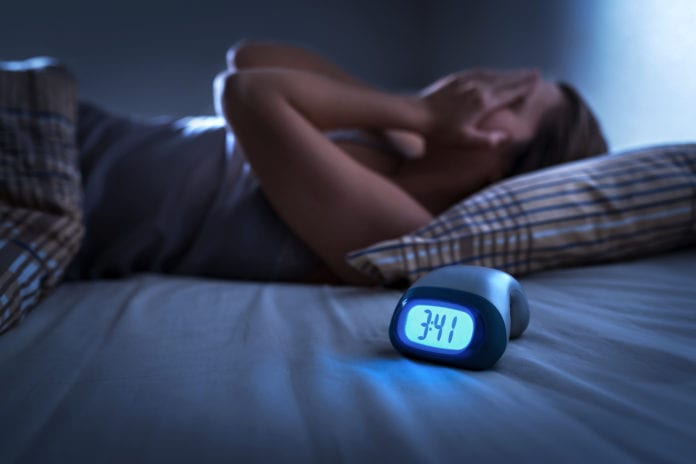If you’re going through perimenopause or menopause and can’t seem to sleep, don’t worry; you’re not alone. More than 60 percent of women in their late 40s to early 50s have experienced insomnia or regular sleep disruption as a side effect of perimenopause/menopause. This is due to the major hormonal changes taking place in the body that can mess directly with your sleep schedule and make it seem impossible to fall asleep. However, there are many ways to help with this that you can do on your own or with the help of a doctor. And in this article, we’re going to talk all about them.
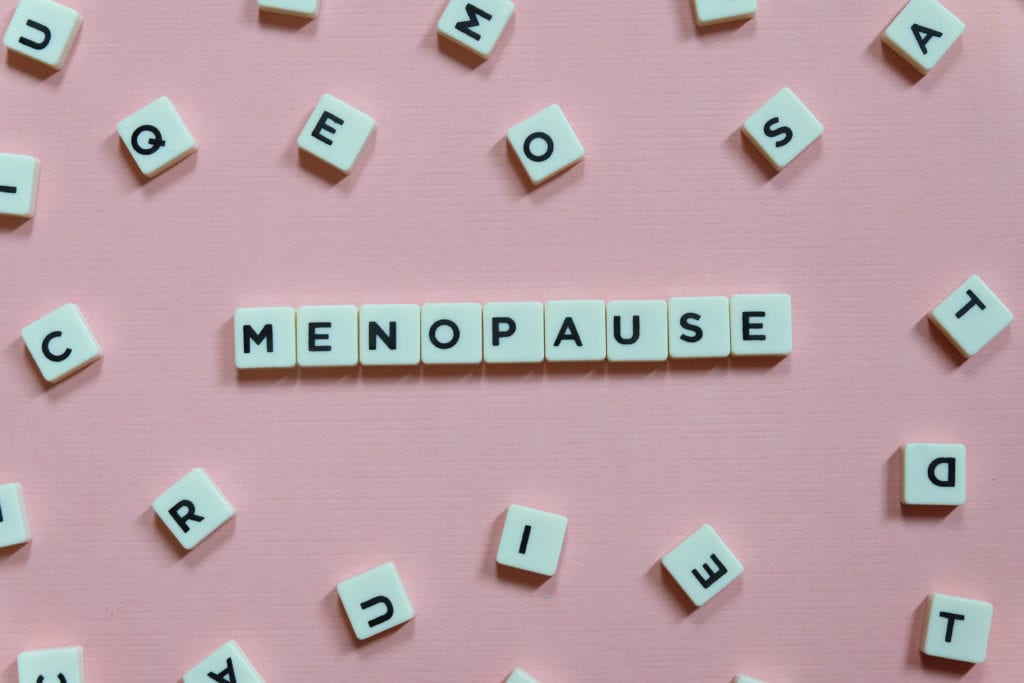
From medications to your diet, here’s our complete guide to menopause insomnia and how you can improve the quality of your sleep.
What is Menopause Insomnia?
To start off, menopause is the period in a women’s life when her ovaries stop producing the hormones estrogen and progesterone in their late 40s to early 50s. Estrogen directly affects the sleep cycle, as higher levels of it help to maintain good sleep patterns and focus. In addition to that, progesterone has a calming effect on the body, helping to relax the mind and maintain a positive mental state. When these two hormones are fluctuating and decreasing during menopause, it can have a very negative effect on a woman’s sleep pattern, leading to restlessness, distress, and insomnia. Some of the symptoms of this include:
- Trying to fall asleep for 30 minutes or longer with no success
- Regularly getting five to six hours of sleep
- Waking up frequently in the night
- Feeling sleepy throughout the day
These sleep disturbances, aside from drowsiness and irritability effects, can also lead to excess anxiety, stress, depression, nausea, and headaches. Therefore, menopausal insomnia is not to be taken lightly and should be dealt with as soon as it rises.
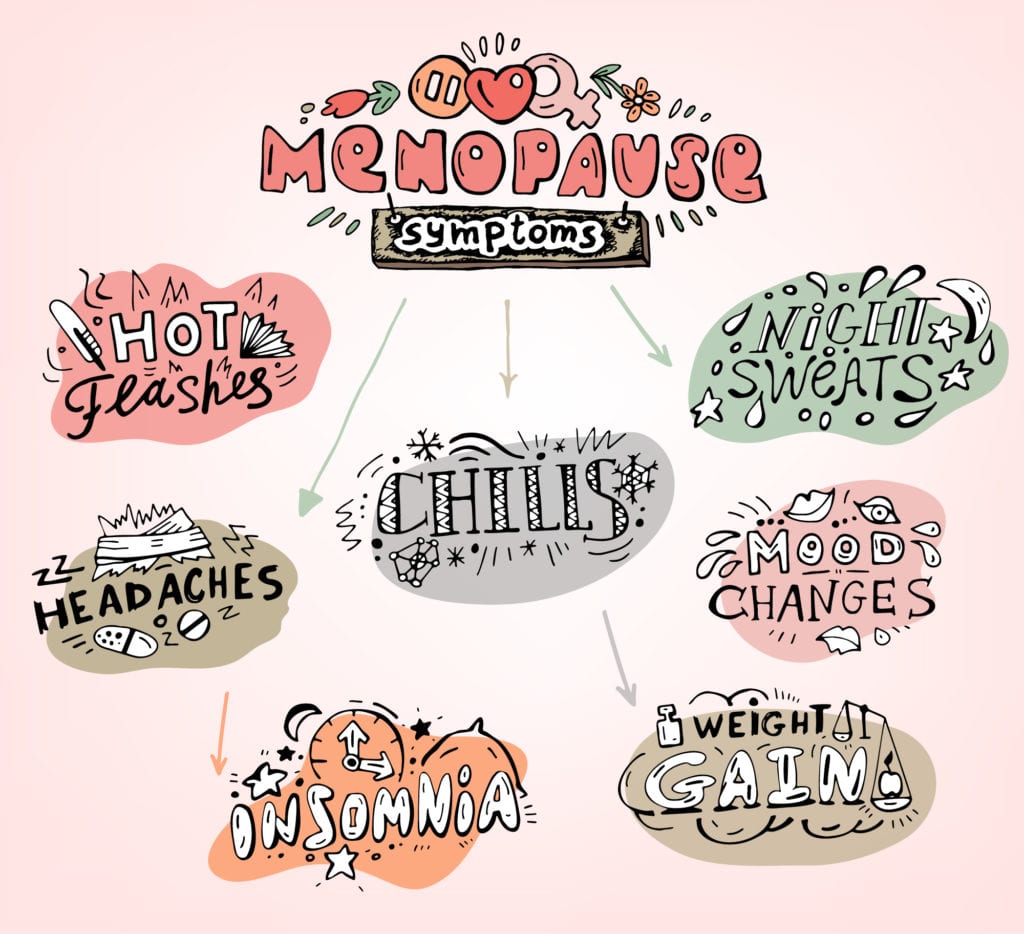
Causes of Menopause Insomnia
When it comes to the causes of insomnia during menopause, there are a vast number of reasons women may struggle to get to sleep, and most of them have to do with hormonal changes. However, there are other causes as well. Here’s a list of the most common causes of insomnia that women typically experience during menopause.
1. Hot flashes
Hot flashes are the most common side effects of menopause and play a direct role on your ability to sleep. As your hormone levels change, you may feel hot and cold throughout the night. This could make you wake suddenly and make it difficult to fall back asleep. According to research, it is believed that around 80% of menopausal women experience hot flashes like this on a regular basis.
2. Anxiety
Next, another common side effect of the decline of estrogen in the body and hormonal shifts is that they can cause anxiety and depression. Not to mention, anxiety can also increase when hot flushes occur, which is often when you are sleeping. As a result, your mental well-being can be significantly influenced by these changes, which can lead you to feeling anxious, stressed, and depressed.
3. Bladder problems
Another of the most common causes of insomnia during menopause is due to bladder issues. During menopause, women do not have as strong of a hold on their bladder due to the deteriorating urinary tract wall from the decrease of estrogen. Therefore, menopausal women have to visit the bathroom frequently, which can make sleeping hard to deal with. On top of that, bladder pains from the decrease of estrogen in the body is another contributing factor to disruptive sleep and can lead directly to insomnia.
4. Medications changes
Aside from hormonal changes and natural body changes, changes in medications can also directly affect your sleep schedule. If you have recently started taking a new prescription or over-the-counter medication for health issues or for menopause itself, you may want to talk to your doctor about if it could be contributing to your lack of sleep.
5. Lifestyle habits
And lastly, lifestyle habits and changes can also contribute to insomnia in menopause. A large majority of women who go through menopause start to deteriorate in their health and lack exercise and proper nutrition. And as your body changes so much, so must your nutrition and your exercise. More than ever, this can heavily contribute to how menopause affects your body and your sleep schedule and should be taken seriously.
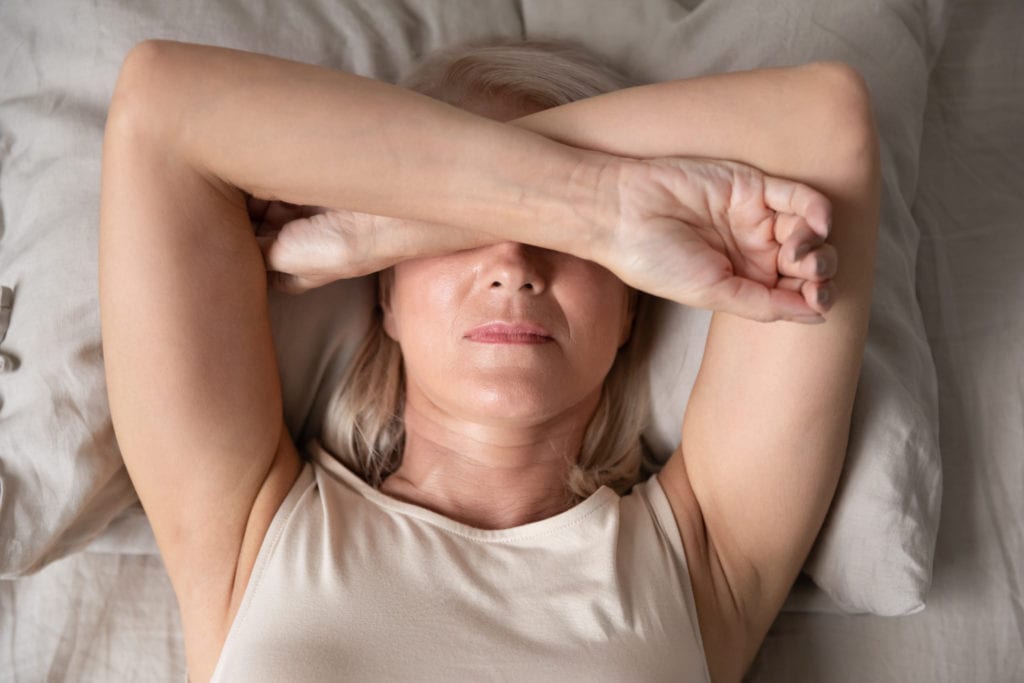
Ways to Treat Menopause Insomnia
Next, the traditional treatment for the symptoms related to menopause can be treated in a variety of ways. Changes in your diet, taking supplements, and exercise are all ways help to combat this. Here’s a brief overview of some of the best ways to ease sleep-related issues in regards to menopause.
Supplements
The first way is to try taking supplements to combat the effects of menopause insomnia. Here’s a list of a few of the most common supplements taken for menopause insomnia.
1. Magnesium
Magnesium is the first supplement you should consider taking during menopause, as research has shown that a low magnesium level may even lead to insomnia itself. To put it simply, magnesium helps in aiding sleep by activating the parasympathetic nervous system, which helps you to feel calmer. For this reason, magnesium is commonly used to help reduce anxiety and emotional distress, overall calming the mind and making the chances of insomnia less likely.
2. 5-HTP
Next, 5-HTP (5-hydroxytryptophan) contributes to the production of serotonin and plays a large in the sleep-wake cycle. Serotonin (the happy hormone) helps the secretion of melatonin (the sleep hormone), which overall prepares your body ready for sleep. Additionally, it may even help speed up the time it takes to fall asleep, leaving you tossing and turning for a shorter period of time. On top of that, it is also often used to reduce migraines and headaches that go along with menopause.
3. L-theanine
Next, L-theanine (often found in green tea) is an amino acid that may help to improve sleep quality by supporting normal mental function. When consumed, this complex can help to increase the feel-good neurotransmitters in the body, such as serotonin and dopamine, and help to promote a more relaxed state of mind. Not to mention, these amino acids also help to elevate GABA (Gamma-aminobutyric acid) in the body, which is a natural amino acid that helps to promote a calmer and may help with reducing the chances of insomnia.
However, it is important to note that supplements and medications should always be discussed with your doctor prior to taking them to properly understand the risks, benefits, and which one option may be best for you individually.
4. Herbal tea
Next, herbal teas are a natural supplement most known for their ability to help soothe the nerves, calm the mind, and relax the body. Many herbal remedies, such as mint, lemon balm, lavender, or chamomile, have been shown to help promote sleep in those with insomnia. Therefore, a cup of herbal tea before bed may be a useful addition to your sleep schedule if you’re looking for a more natural route to soothe your symptoms.
5. Hormone Therapy
And lastly, another common treatment for menopause insomnia is hormone therapy. In some cases, sometimes all it takes is a very small dosage of estrogen to help ease and rid the body of certain menopause symptoms. However, on the other hand, hormone therapy does have significant risks, and is, therefore, important to check with your doctor for hormone options, their side effects, and if they are right for you. You can read more about hormone therapy treatment for menopause side effects here on mayoclinic.com.
Daily Exercise
Next, daily exercise can help to fix many problems in life, and menopause is no different. Studies suggest that simple exercises that you can do in the comfort of your home may be a good way to help improve your quality of sleep. A few simple exercises to try might include:
- Stretching before bed
- Light yoga or resistance band workouts
- Afternoon walks
- Bodyweight exercises
- Beginner aerobic exercises
Overall, whether it’s picking up yoga, afternoon walks, or any other form of physical movement, exercise will help your body to exert pent-up energy and help you to feel more tired, assisting with a more likely chance for restful sleep. Aside from that, it will also help to boost your overall mood and vitality, which is a huge plus. However, make sure you don’t exercise within two to three hours of your bedtime, as that can have the opposite effect on the mind and keep you awake.
Diet change
Next, on top of exercising, you may also be able to help to reduce the symptoms of insomnia by changing your diet. In a brief study of women going through the three stages of menopause, researchers found that consuming foods that had a low GI (glycemic index) was associated with a reduced risk for insomnia (nytimes.com). This includes foods such as nuts, whole-grain bread, and vegetables.
With that said, eating foods with a high GI, however, made it more likely for women to struggle with insomnia. This is due to the rapid rise and fall of blood sugar levels, which keep you awake and even wake you from a restful sleep. For that reason, adjusting your diet as necessary and talking to your doctor about diet options may also be a helpful way to combat the negative symptoms of menopause insomnia.
Choosing the right bedding
Next, another cause of insomnia may be that you need to change your bedding. For example, weighted blankets may be a great addition to your bed, as these have been shown to help relieve menopausal symptoms. On top of that, weighted blankets are also often used for relieving symptoms of depression and anxiety, as they can help you feel calmer, safer, and more secure. However, you can also improve your sleeping experience by trying new sheets, new material on your bed, or even an entirely new mattress.
Above all else, you’ll want to make your bed is as comfy and as cozy as possible to make your chances of getting sleep higher.
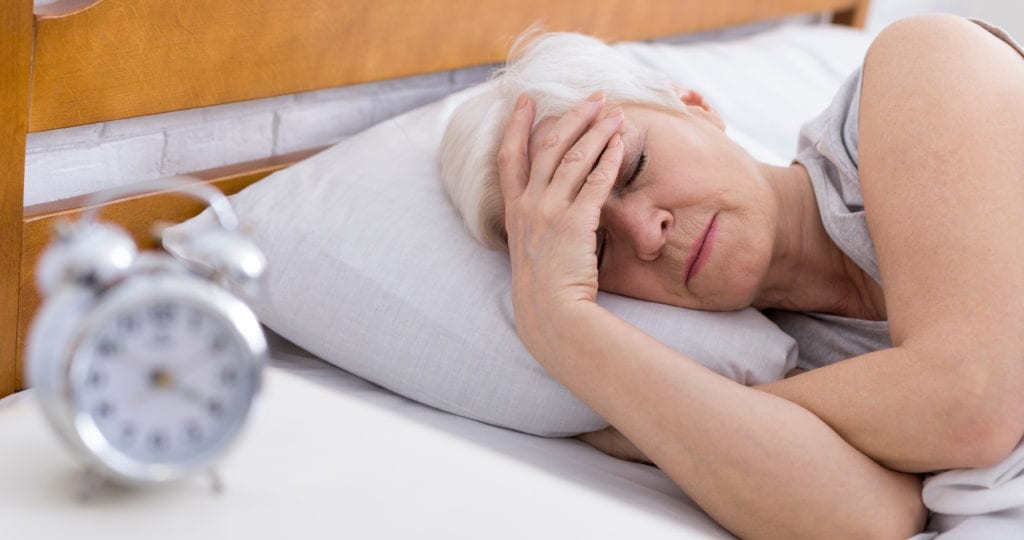
Additional Tips
And finally, on top of the other adjustments mentioned above that you can make to try to help improve your insomnia, here are a few additional tips and tricks that may also help you out.
1. Take naps
The first great tip recommended is to try to take naps throughout the day if you can. It doesn’t have to be long; even just taking a 10-minute nap on your lunch break at work is a good idea to help you feel more refreshed. Whatever it is, frequent and short naps to catch up on sleep throughout the day are essential and are best done before 4 pm to help you still get sleep later that night.
2. Fix bad habits
Next, more than ever, leaving some bad habits behind you may also be a good idea during menopause. This typically includes smoking and or drinking. While people often use these habits as a way to get to sleep, they can actually prevent you from reaching your most restorative sleep, leaving you feeling lethargic and unrested. Not to mention, smoking is full of nicotine, which is a known stimulant. Therefore, smoking before bed or any time of the day can keep your brain awake and make it nearly impossible to get to sleep. For that reason, menopause is a great time to start weaning yourself off of any bad habits you may have to help you get better sleep and improve your health overall.
In addition to that, trying to cut out caffeine is an excellent idea as well, as it will help keep your mind more relaxed. Instead, try using calming herbal teas such as mint or chamomile instead, as these will keep the body mellow and calm your brain activity.
3. Try relaxation techniques
Next, another great way to help get your body ready for sleep is to find a way to unwind and relax before bed. Watching tv or scrolling on your phone can leave your mind stimulated, which will keep you up longer. However, practices such as light yoga, stretching can have the opposite effect and leave you feeling calm and relaxed.
4. Create the right ambiance
Next, creating the right ambiance in your room when you go to sleep is another essential rule to getting good sleep. This usually consists of keeping it dark, quiet, and cool at all times. In addition to that, you’ll also want to sure you don’t engage your focus scrolling on your phone or watching TV and give yourself around 30 minutes to unwind without technology before you even climb into bed. This will help to tell your brain that it’s time to rest and relax and will overall promote a more likely chance of sleep.
5. Keep your body temperature down
Next, just as how we mentioned keeping your room cool, you’re also going to want to take proper precautions to help keep your body cool as well. Keeping a damp rag next to your bedside or wearing very light pajamas are great ways to help keep yourself cooler and can help fight the effects of hot flashes that go along with menopause.
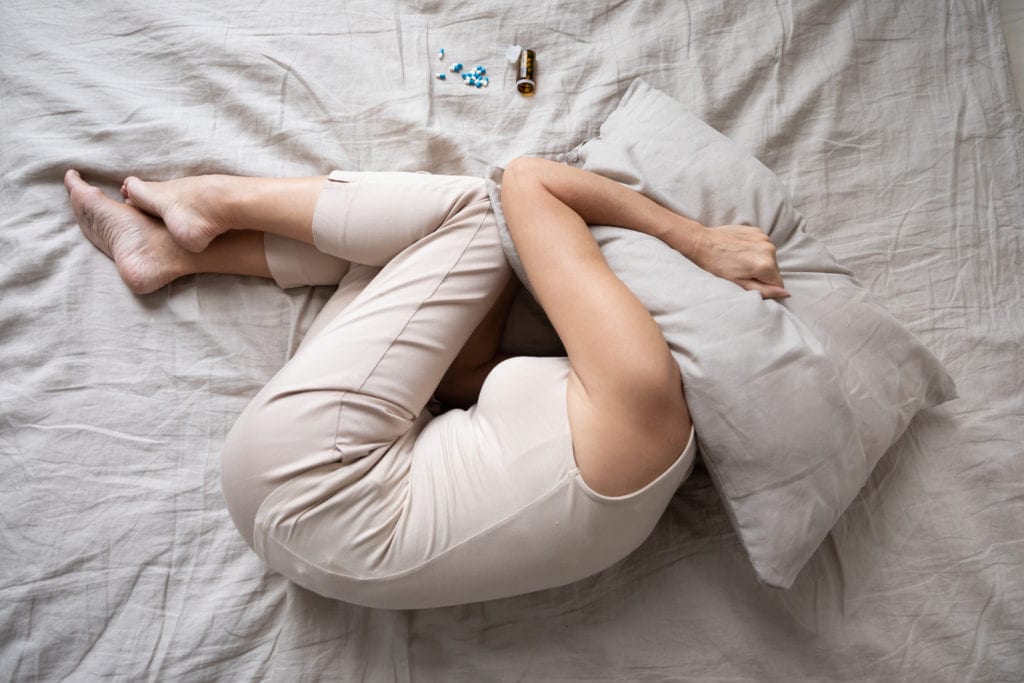
6. Try different sleeping positions
Next, changing your sleeping position while transitioning into menopause may also be helpful. Studies suggest that sleeping on your back may help to promote more restful sleep, as it does not put any strain on your body as many other sleeping positions do. For that reason, rolling around and trying some new sleeping positions to see which fits right for you is highly recommended.
7. Maintain a consistent sleep schedule
And lastly, just as how you only see results when your workout consistently, you’re going to want to keep your sleep schedule consistent as well. This means you should try to go to sleep each night at the same time and follow the same nightly preparations you would to prepare for it. This will help get your body in a routine of knowing when to unwind and when to wake up.
Conclusion
Overall, insomnia is one of the most straining side effects of menopause. However, since more than half the women going through menopause are bound to experience it, it’s best to research ways to help ease it as soon as possible. We hope this article has given you some insight into some new ways to try to get back on track with your normal sleep schedule and helps promote a more restful, comfortable, and refreshing sleep unlike any other.
Sources:
https://www.womens-health-concern.org/help-and-advice/factsheets/menopause-and-insomnia/
https://www.nia.nih.gov/health/sleep-problems-and-menopause-what-can-i-do
https://www.healthline.com/health/menopause/menopause-and-insomnia
https://www.hopkinsmedicine.org/health/wellness-and-prevention/how-does-menopause-affect-my-sleep
https://www.health.harvard.edu/blog/menopause-and-insomnia-could-a-low-gi-diet-help-2020011718710


